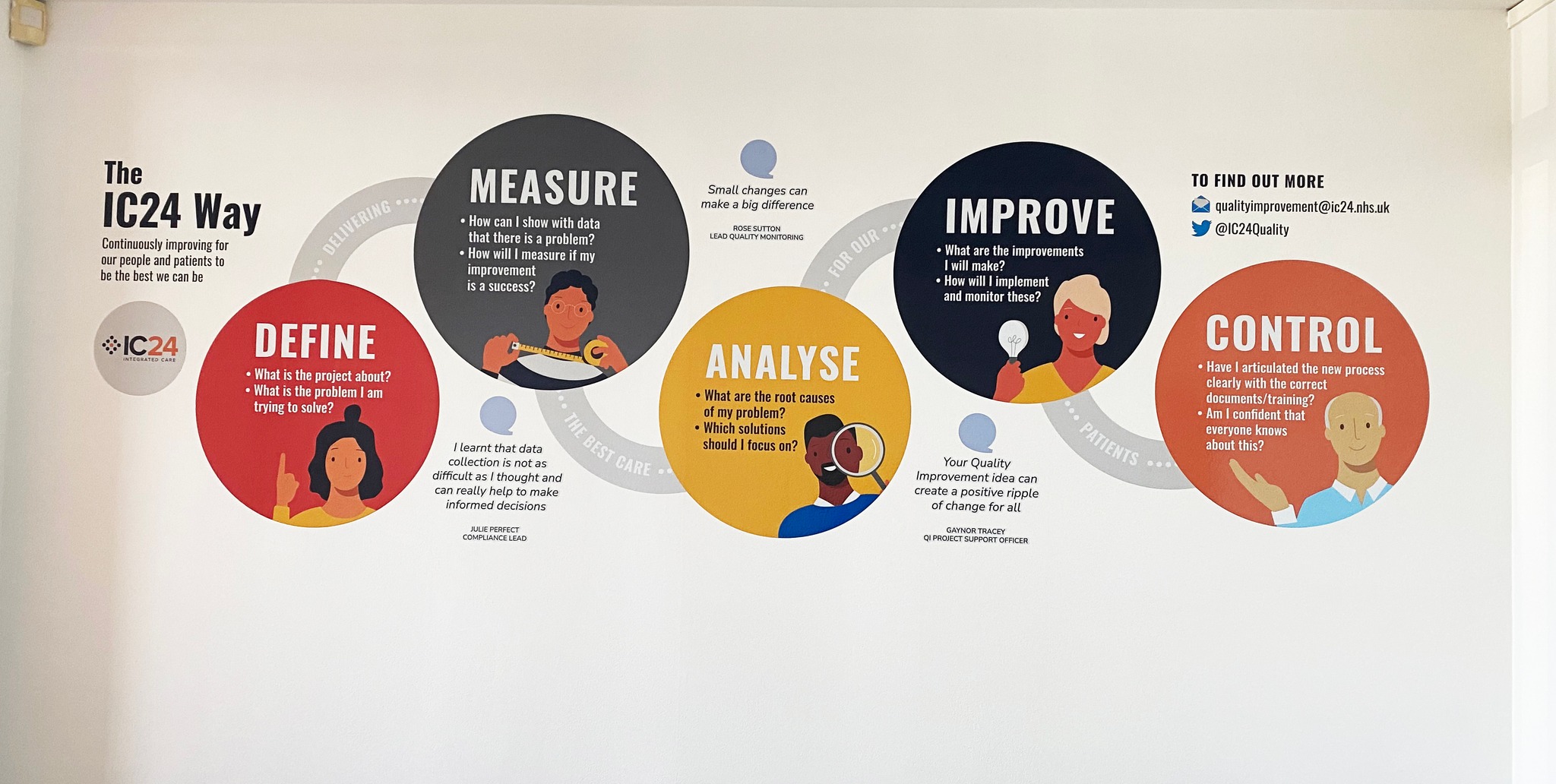How Quality Improvement and Digital Work Together in Health Care
In this blog post we’ll be sharing what makes integration between Quality Improvement and Digital a perfect match.
by IC24

At IC24 we seek to provide responsive, safe, high-quality urgent healthcare at the right time, in the right place, supporting our patients to ensure they live their lives to the full. Quality improvement (QI) provides a vehicle for achieving collaboration, partnerships and truly integrated care. One of QI's most important collaborators is digital teams.
What Does the Quality Improvement Process Look Like?
At IC24, we use the Lean Six Sigma methodology, which is applied by utilising the DMAIC framework (Define, Measure, Analyse, Improve and Control), a five-phase technique to improve complex problems with multiple solutions.
Our Quality Improvement framework encourages our colleagues to think differently, challenge the status quo and use QI to maximise our opportunity for positive and sustained change. ‘The IC24 way’ is about continuous improvement for our people and patients to be the best we can be. Most importantly, it’s a team sport, involving and engaging everyone.
QI and Digital Go Hand in Hand
In 2014, the National Information Board published a framework for action to encourage healthcare providers to make better use of data and technology and realise the power of this to improve health and transform the quality and reduce the costs of healthcare services. In terms of integrated urgent care, this was supported in 2015 by the publication of ‘Transforming urgent and emergency care services in England’. The common thread through the Five Year Forward View and Long-Term Plan is the adoption and development of technology to ensure urgent care services are responsive and delivered to a high quality.
Those working in the services that we provide can often design the best solutions to challenges. To do this, they need to be included in and supported to develop conversations around digital innovation.
Improvements should be data led and measurable and the impact of technology cannot be unstated. The use of technology allows for timely access to reliable data, which informs change. By working closely with our digital teams, we are able to make sure that data is not only easy to access but is presented in a user-friendly way.
Use of Innovative Technology
Encouraging our people to challenge the status quo encourages innovation, which drives improvements to the quality of care our patients receive. The relationship and integration of our QI and Digital teams at IC24 enables learning from QI methodology and provides an opportunity to encourage colleagues working to deliver our services to engage with technology and consider a digital perspective / solution whilst working collaboratively with our Business Intelligence and IT teams.
This supports integration of our digital innovation strategy through the vehicle of QI supporting and empowering clinically led quality improvements with a technology focus which are underpinned by actionable insights.
In 2021 we integrated speech analytics software into our NHS 111 contact centres to better understand our patients to ultimately provide better care.
Integrated speech analytics software ensures every conversation counts, and we are now able to identify how a patient is feeling towards the service they received using ‘AI sentiment analysis’ as well as being able to identify topics around busy times.
How it Improves the Patient Experience
We have a responsibility to engage patients in improving our healthcare services. Connecting with our patients using digital technology makes it easier to discuss how we can make improvements that benefit them.
Thanks to our patient feedback, with our NHS 111 service, we’ve introduced automated ‘comfort messaging’. This keeps our patients informed via text message if we won't get to them within the initial timescale, using wording developed using patient feedback. Low-risk patients can cancel after receiving a second message. This allows patients to let us know they no longer wish to receive a call back quickly and easily, reducing pressure on the system. This invaluable feedback has reduced pressure on our workforce, freeing their time from manual 'comfort calling' and enabling them to respond to more initial calls.
Keep up to date with IC24’s QI journey by following our dedicated QI Twitter account.